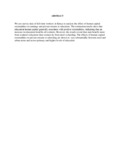| dc.contributor.author | Kimenyi, Mwangi Samson | |
| dc.contributor.author | Mwabu, Germano | |
| dc.contributor.author | Manda, Damiano | |
| dc.date.accessioned | 2013-05-16T13:43:48Z | |
| dc.date.available | 2013-05-16T13:43:48Z | |
| dc.date.issued | 2006 | |
| dc.identifier.citation | Eastern Economic Journal | en |
| dc.identifier.uri | http://econpapers.repec.org/scripts/search/search.asp?ss=1&adv=t&sslg=AND&ni=&nit=epdate&mh=100&sort=rank | |
| dc.identifier.uri | http://erepository.uonbi.ac.ke:8080/xmlui/handle/123456789/23655 | |
| dc.description.abstract | We use survey data of full-time workers in Kenya to analyse the effect of human capital externalities on earnings and private returns to education. The estimation results show that education human capital generally associates with positive externalities, indicating that an increase in education benefits all workers. However, the results reveal that men benefit more from women's education than women do from men's schooling. The effects of human capital externalities on private returns to schooling are shown to vary substantially between rural and urban areas and across primary and higher levels of education | en |
| dc.language.iso | en | en |
| dc.relation.ispartofseries | Vol. 32, issue 3, pages 493-513; | |
| dc.title | Human capital externalities and private returns to education in Kenya | en |
| dc.type | Article | en |
| local.publisher | Faculty of Arts, University of Nairobi | en |

